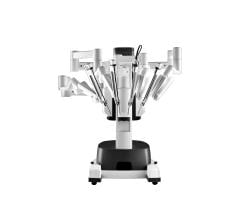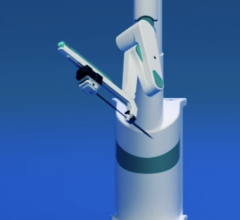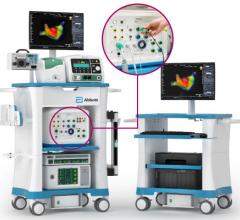
May 14, 2014 — Detroit Medical Center (DMC) Harper Hospital presented a live CorPath robotic-assisted percutaneous coronary intervention (PCI), or coronary angioplasty, during the American College of Cardiology (ACC) annual meeting this year. The procedure, which was transmitted live to Washington, D.C., for meeting attendees, was led by Ted Schreiber, M.D., president of the Cardiovascular Institute and director of the Cardio One team at DMC Harper Hospital. Schreiber was the driving force behind the launch of the CorPath robotic angioplasty program at DMC, the first robotic angioplasty program in the Midwest.
Amir Kaki, M.D., medical director of cardiac catheterization laboratories at Detroit Medical Center, performed the procedure using the CorPath system, the first U.S. Food and Drug Administration (FDA)-cleared device to bring robotic precision to coronary angioplasty, helping to optimize clinical outcomes. During the case, Kaki was able to control the advancement and placement of the balloon/stent catheter with enhanced precision from within the CorPath’s interventional cockpit. The accuracy provided by the system’s measurement function enabled Kaki to identify the most appropriate length stent for the patient. During the case, he precisely placed the stent using the millimeter-by-millimeter movement while the audience watched from the conference hall.
Kaki performed the angioplasty on a high-grade, complex, ulcerated lesion that was blocking 90 percent of the blood flow through a major artery in the heart. “The improvements in precision and accuracy provided by robotic-assisted systems enable a higher level of precision for interventional cardiologists, which then gives them significant confidence in reassuring patients they are receiving the best possible care,” said Kaki. “Knowing the exact measurement of the relevant anatomy – down to the sub-millimeter – can positively impact patient outcomes in coronary angioplasty procedures.”
Schreiber said, “We are proud to be able to show a case live from DMC Harper Hospital that offers the interventional cardiology community a glimpse behind the technology that is transforming the way safety and precision are defined in PCI procedures.”
The CorPath system enables precise, robotic-assisted angioplasties to open arteries and restore blood flow in patients with coronary artery disease. During a CorPath procedure, the interventional cardiologist sits in the radiation-shielded interventional cockpit and advances stents and guidewires using digital controls with millimeter-by-millimeter robotic precision. CorPath may improve clinical outcomes by enabling precise measurement of the anatomy, which could potentially lead to better stent placements.
“The precision enabled by robotics in coronary angioplasty procedures may deliver benefits to the entire care cycle. Patients benefit from potentially optimized clinical outcomes, physicians benefit from significantly reduced radiation exposure and facilities can benefit from minimizing costs of additional stent placements and follow-up procedures,” said David Handler, president and CEO of Corindus Vascular Robotics. “We will continue to work with Dr. Schreiber, Dr. Kaki and other leaders in interventional cardiology to showcase the safety standards and care quality achievable in PCI procedures through vascular robotics.”
For more information: www.corindus.com


 January 27, 2026
January 27, 2026 








